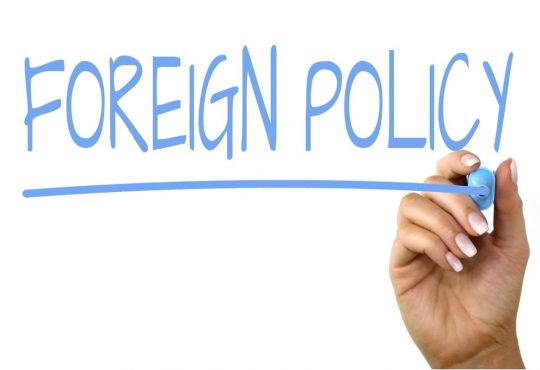by Michael Greenblatt
Recent events in world news have been favorable for the U.S. and its place in the global order: a reopening of relations with Cuba, a likely nuclear deal with Iran, a mutual commitment to reduce carbon emissions from the U.S. and China.
All of these breakthroughs can be attributed to President Obama’s foreign policy preference for engaging and negotiating with the United States’ foreign adversaries. This is a fundamental distinction from the policies of George W. Bush and leading Republican candidates for president, who advocate isolation and aggression, sometimes war, towards America’s enemies. Remember Bush’s notorious “Axis of Evil” that consisted of Iran, North Korea and Iraq?
Aside from drawing tremendous international condemnation, Bush’s foreign policy plan was highly ineffective, and even counterproductive. You don’t need to look further than the endlessly unstable situation in Iraq to realize that the instability was caused by the U.S. invasion, not to mention the false pretenses under which the invasion was justified.
The U.S. has a thirst for war: it has been at war for over 200 years of its 238-year existence and spends about 25 percent of its annual budget on defense, spending hundreds of billions of dollars more than its closest competitor, China, does. Yet even with such an intense focus on war, our problems have not gone away—in the Middle East, they’ve gotten a lot worse over the past two decades, despite our constant efforts to straighten out every mess that pops up.
Ironically, many of the current problems that the U.S. faces in the Middle East were in fact caused by our interventionist foreign policies. These include the current Islamist regime in Iran, which overthrew the Shah’s government due to his close ties to the U.S., and even the growth of al-Qaeda, as Osama bin Laden and his small group of soldiers were directly funded and trained by the U.S. government to fight against the Soviet Union’s occupation of Afghanistan in the 1980s.
Latin America was hit particularly hard by the United States’ interventionist foreign policies during the Cold War. In Chile, President Salvador Allende was overthrown by General Augusto Pinochet in a coup that was covertly supported by the U.S. government—Pinochet ruled dictatorially for 17 years afterwards. In El Salvador, the U.S. supported the government’s brutal civil war against socialist guerrillas that lasted for almost 13 years and killed more than 70,000 people. This is relatively minor compared to the U.S.-backed civil war in Guatemala, which lasted for 36 years. And, let us not forget the infamous Iran-Contra scandal, in which the Reagan administration sold arms to Iran, an enemy of the United States, and used the money to fund the opposition army fighting against the socialist government in Nicaragua. The residual effects of these interventions continue to destabilize these countries, and we even see some of these effects in the United States in the form of Central American migrants.
The history of the United States’ military interventions abroad is dismal. Military intervention can only do so much, and it must only be used as a last resort. Examples from the past century show that the United States’ interventionist foreign policy often fails, while at the same time it creates unintended consequences. Using war as an instinctual response to a foreign policy problem is unsustainable, and unethical. A new foreign policy framework is needed to maintain the global leadership that Americans crave, and to set a positive example for the international community.
President Obama’s policy of direct negotiation over intervention and war presents a much greater opportunity to achieve positive and lasting results than the war posture of America’s foreign policy in the second-half of the 20th century.
Had it not been for negotiation and compromise, we would still be closed off to Cuba and have a useless embargo against the country, which is likely to be lifted soon (not only has 50 years of the embargo had almost no effect on changing the country’s regime, but every year since 1992 the UN has passed a resolution condemning the embargo that was signed by every member state except for the United States and Israel). The reestablishment of relations with Cuba has already elevated international opinion of the United States significantly, especially in Latin America.
Likewise, direct negotiation and compromise is responsible for the potential nuclear deal with Iran. Had it not been for the negotiations, it is likely that the U.S., Israel and other NATO countries would have gone to war with Iran and its allies, likely resulting in a nuclear war.
Finally, the joint commitment by the U.S. and China to each introduce stronger regulations against carbon emissions within their countries is yet another major international breakthrough. This is the first time that China, the world’s largest greenhouse gas polluter, has ever agreed to limit its carbon emissions. Before this, both China and the U.S. criticized each other for their lack of greenhouse gas restrictions and used this as an excuse to not create those very restrictions. Similarly, international climate change treaties were consistently held up by a lack of support from the U.S. and China. Now, however, the potential to reach a new legally binding international climate change accord next year is the strongest it’s ever been.
Critics of President Obama’s negotiating tactics worry that he’s showing weakness and that he is giving in to the demands of the United States’ enemies. That is plainly untrue, as the above examples all show that the U.S. will benefit as much as any other country.
To deny other countries the chance to negotiate is to deny them legitimacy, essentially saying that our demands are much more valid and just than theirs are. This is insulting and arrogant.
U.S. foreign policy in the past half-century has inserted itself into many conflicts, resolving few and creating more unforeseen problems. Yet all three of these recent developments now face promising resolutions thanks to President Obama’s insistence on negotiation and compromise over intervention and war. U.S. foreign policy in the future must continue this trend by placing negotiation as its central tenet, sparing war as a weapon of last resort. Our prospects for actually resolving problems, instead of masking them, are best met by directly engaging our adversaries and allies at the bargaining table.






